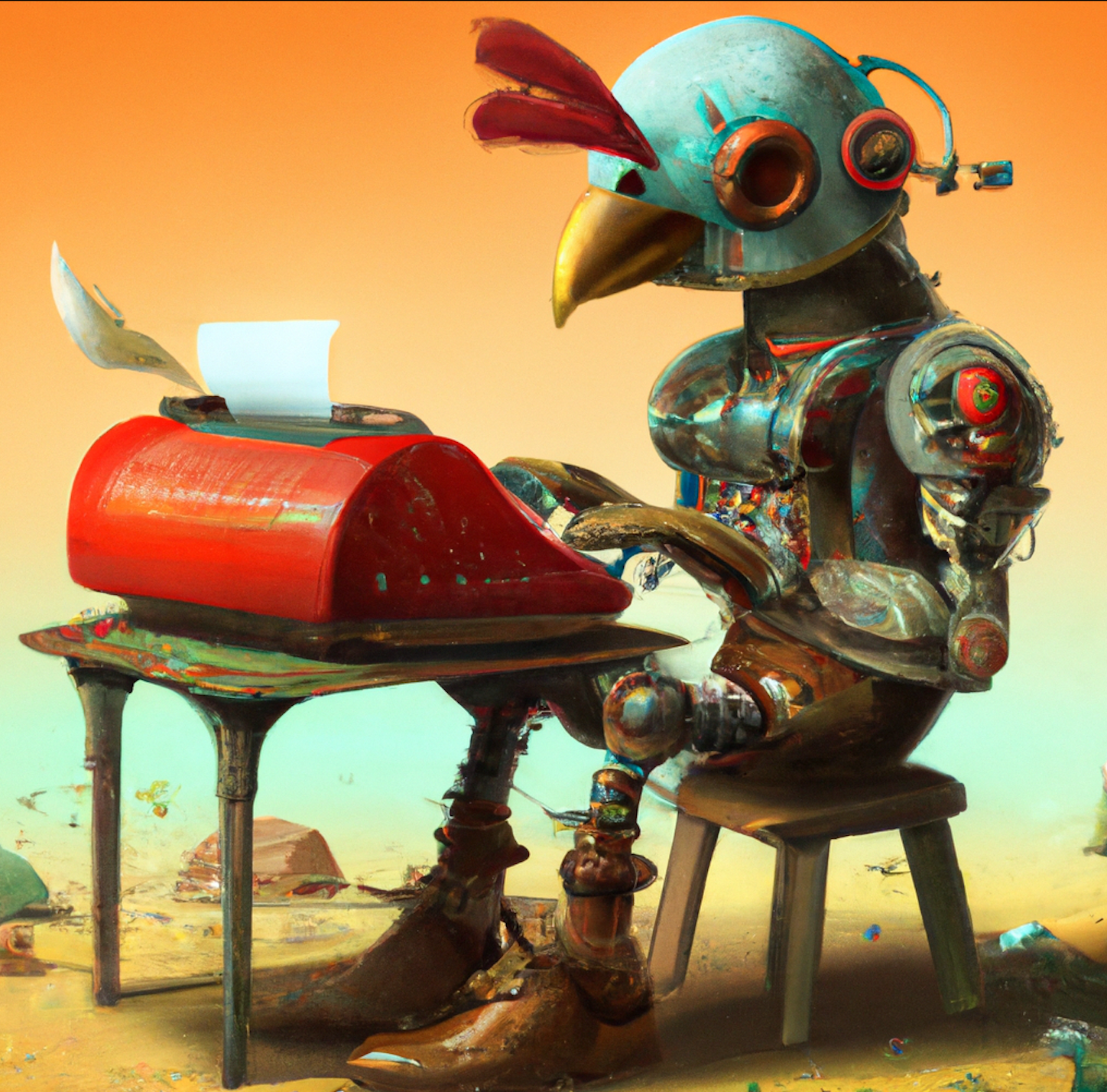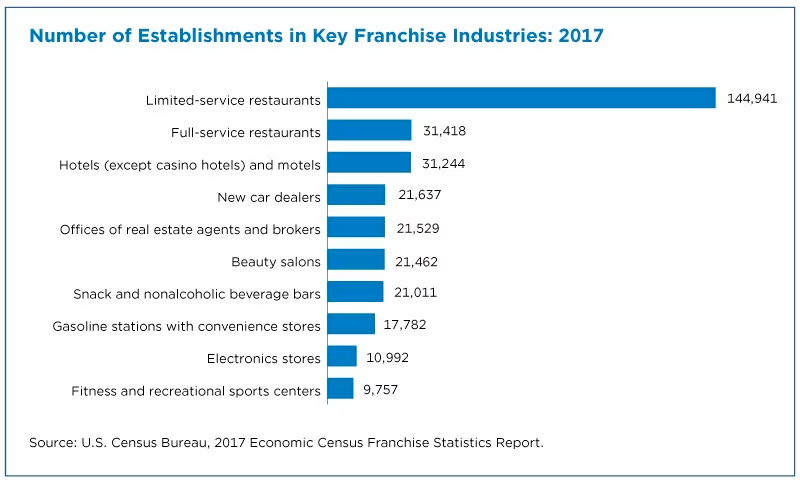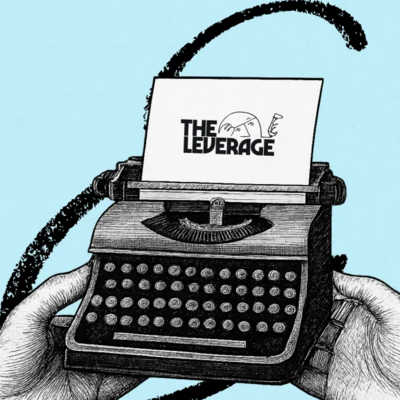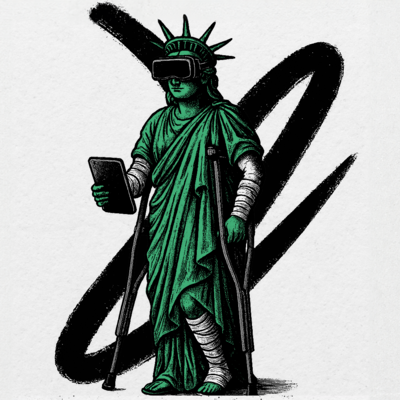
When Bing-Terminator edition comes along and takes our jobs, I will be sitting pretty. You see, I’m going to pivot my career from writing newsletters to slinging chicken nuggets. My master plan—own a Chick-fil-A. I figure that when our robot overlords rise up, they will still crave the savory tang of Polynesian sauce, the sweet smoothness of a peppermint shake. We won’t need any more tech writers, but we will still need people who can deliver a perfectly crunchy waffle fry.
I’m being a little facetious, but AI making knowledge workers redundant is happening right now. My sense is that, even with all the hype, analysts are still underestimating how disruptive these text-generation models are. In my research, I’ve held calls with doctors, university professors, engineers, salesmen, and magazine editors. They all confess, in hushed tones, that they are secretly using ChatGPT to do some of their work for them. None of their colleagues have been able to tell though. (My guess is that their colleagues are secretly doing the same.) It has allowed them to do less work while receiving the same pay. In fact, a working paper out of MIT came out this morning showing an experiment where white collar workers given access to ChatGPT finished a task 35% faster.
In my first piece on this new tech, I argued that “AI takes content creation to zero.” At the time, most of my readers took me to mean that content creators would become unemployed. This is not an expansive enough view. A more accurate way to think about it: If you type on a keyboard, AI makes you redundant.
In the short term, it will only make some of us less redundant. Think of it in terms of farming—in 1850, farm labor was 4.9M people, or ~64%, of the U.S.'s 7.7M workers. Today, there are only 2.6M farmers, or 1.3% of the United States labor force, but these farmers make exponentially more food using modern technology such as tractors, GMOs, etc. A similar phenomenon applies to anyone who types for a living. Much fewer people will be required to create even more output than before.
It is therefore reasonable in the face of this coming white-collar doom to try to hedge. This brings us back to Chick-fil-A. As my scale would tell you, I tend to eat my feelings. Last week, in the midst of an existential AI crisis, I sat in a parking lot, staring down at a half-devoured Spicy Deluxe Chicken Sandwich, and wondered, “Should I just do this instead?”
We are talking stocks here
Let’s say I came to you and pitched the most incredible stock opportunity. You could be owning early shares of the next Apple or Facebook or Google! You’ll be rich! The only itsy bitsy, tiny little thing is that ownership would have the following requirements:
- 5 years of manual labor
- 75%+ of your net worth is on the line
- You can obtain loans for this investment, but you are personally liable for them
- You can sell the stock only when the company says they are cool with it
- It is in a sector that is considered one of the riskiest in the entire world
This is not a stock. This is what is required to be a franchisee. You would likely respond to my proposition, “I do not want to do that thing because I do not snort glue.” (Wise response.) However, someone has made this exact choice 498,234 times in the United States.
These franchises represent 11.4% of all businesses in the industries published and covered by the report from the US Census Bureau. The establishments employed 9.6 million of the 63.3 million workers in these industries. So obviously somebody out there found value in franchise investments despite the risks. Perhaps my backup plan has merit!
Before I continue my diatribe on fried chicken and its somewhat tenuous relationship with our oncoming Android Autocrats, it is worth considering what an investment is. An investment opportunity is when one type of asset is used in the creation of another asset. In an ideal world, the asset created is eventually worth more than the asset risked. You invest time into a date in the hope of finding a partner (unlikely); you invest dollars into crypto in the hopes of becoming a millionaire (even more unlikely). Whenever an investment occurs, equally importantly, a competing investment does not. Investors also need to worry about opportunity cost—the choice to invest in one franchise precludes you from investing in something potentially better. This makes the choice of becoming a franchisee even more perplexing.
Envision a spectrum of distribution where on the left-hand side is corporate serfdom, a white-collar job of the mouth-droolingly dull variety. On the right-hand side of the graph lies supposed economic freedom, the siren song of entrepreneurship, a banana stand where you put all your life savings. Importantly, both of these are investments. The difference is in what you are choosing to risk and what you could potentially gain. For the keyboard warrior, you primarily invest your time and trade them for dollars. Your upside is capped, but the return is relatively consistent. If you are an entrepreneur selling some wholly new product in a totally new way, maxing out your credit cards to make it happen, you are still investing your time but you are also risking everything else. Both cases deal with opportunity costs but can have vastly different outcomes. It is crucial to note that in both cases you can strike it rich! It is a question of which investment, one of serfdom or freewheeling, represents the best deployment of your most important asset—your life.
Becoming a franchisee sits solidly in the middle of the personal investment profile distribution. I wouldn’t quite be a drone—I have responsibility over operations and hiring—but I’m not a full entrepreneur either. Say I run a McDonald’s franchise: No one is letting me touch product development or marketing budgets. My role is to provide capital and to make sure the Diet Coke comes out extra spicy and that’s it. Interestingly, when I talked with franchise owners, they all, to a T, called themselves “entrepreneurs.” An appeal of the job appears to be the entrepreneur title without all the accompanying risks (or upside).
So once again, I am left asking, why bother to do this at all?
Franchise markets and marketing
In this industry, as in all of business, the way to make money is growth. Franchisors make money by selling more franchisees on the vision (e.g., building more fast-food locations), and franchisees make more money by owning more locations. A franchise is a linear business; one location can handle only so much volume. Ye olde Chick-fil-A leads the industry at an estimated $8M per location, which is pretty amazing, but still, there is an upward limit of expansion. Eventually you get to the point where growth requires more real estate.
In the U.S., there are over 3,800 franchise chains for the potential franchisee owner to select from. For comparison, there are roughly 3,600 stocks on the Nasdaq stock exchange. Franchisees are asked to put a huge portion of their life savings into a single stock that also comes with the fun bonus of conscripted manual labor. Oh! Bonus is you can’t sell for at least five years, sometimes pushing toward 20 years. In light of this, the rational actor would probably just stick their money in an index fund and go live their life. However, there are two savings graces for this industry:
- Franchisors can actively solicit investors: Public tech companies can’t cold-call every dentist in America saying that they should buy their stock. Thankfully for the fast-food industry, franchisors can! There are very few solicitation rules around them selling their product. There is only one document, the Franchise Disclosure Document, that has a legally mandated 23 sections that cover the agreement. The length can easily be 90+ pages. If you were to evaluate each franchise in the U.S., you could easily have 342K pages of documentation to read. To compensate for this, franchisors will have in-house sales teams, typically called “franchise development,” in which staff is compensated based on how many franchisees they can add. Picture the film The Wolf of Wall Street, if they sold curly fries. Note: It is ironic that the biggest media brand in the space is literally called the Wolf of Franchises. This individual seems to have missed that the movie was about a scam artist.
- Banks will loan capital to individuals: This is the thing that really matters. Franchises are usually able to qualify for a Small Business Loan. The level of capital required varies greatly from franchise to franchise. Chick-fil-A only requires $10K upfront but has much higher fees and more binding ownership agreements. Others may require upfront capital of $500K+ but will allow more ownership freedom. If you go to the bank to ask for capital to finance your new rollerblade shop, you’ll get laughed out the door. But come to them with a McDonald’s franchise agreement and they will have a lot more comfort with the proposal. The best part of franchises is that regular individuals have access to a somewhat proven business model and the cash to finance it.
To be clear, you can get rich doing franchises. Your best bet is to pick an emerging industry and an emerging brand and go all in—you just pray that it ends up like McDonald’s and not frozen yogurt or cupcakes. However, you can get rich doing anything! The risk and personal liabilities that are the norm in this industry don’t make a ton of sense to me. Wealth is achieved in the overlap of skill set, assets to risk, and assets to gain. It is hard for me to accept that this is a particularly good option.
AI, franchises, and asset ownership
On April 24, 1907, around 600 of New York’s lamplighters went on strike to protest the rise of electric lights. Over 25K lights went unlit, and the men thought they had proven their value to society. Instead, all they did was draw attention to the streets that still had light—the ones with electricity. Rather than a glorious demonstration of their value, it was a death notice for their profession. Electricity was better, cheaper, and always available.
Sometimes technology is a total replacement of labor, sometimes it is a supplement. AI is so radically different than any other good because it is a massive increase in productivity that is wholly digitally distributed. If you consider other technology paradigm shifts, whether it was electricity or personal computing or smartphones, the major growth limiter was hardware. You actually had to get the stuff into the hands of the individual. In the case of OpenAI, it has given over 100M users the powers of ChatGPT for less than the cost of one nuclear power plant. There has never before been a technology platform that is build once, distribute forever, for free, through the internet. This will result in a much more rapid disruption pattern than what we have seen in other cycles. It is the most dangerous phrase to say as an analyst, but this time it really does feel different.
In light of this, and in spite of my spending a thousand words talking about how the industry is somewhat slimy, I think franchising is a reasonable response to fears of AI disruption. I’m not sure how Siri-ously smart a choice it is, but it is rational. What makes franchising compelling is that it allows people to increase their physical asset ownership with leverage that would otherwise be unavailable through other options. Robotics has lagged behind other branches of AI research (though there are some signs that transformers are about to change that), so taking on additional leverage to transition out of an asset class I think is no longer valuable (in this case my own career) is fair.
Yes, I’ll have to wade through thousands of opportunities. Yes, I’ll have to spend my days over a deep fryer. And yes, I won’t own my product strategy or marketing budget or have any real, meaningful control over the business. But hey, at least I don’t have to worry about AI anymore.
Really, this is a discussion of AI capabilities and timelines. The past year has made me speed up my existing forecast of AI capability. If this trend continues for the next five years, we are looking at a radically different world, one that is so different it is hard to even comprehend. It is important for me to advise caution with these choices. In the case of AI, we are playing with probabilities, not certainties. I’ve known people who go all in on other technology trends they thought were the future—cough, crypto, cough—and lose it all. It could be the case here that I am caught up in the hype machine but am too dumb to recognize it.
From the period of 2016–21, I became more and more skeptical of American society. The stupidity of Trumpism, the total Covid response failure, our inability to pass meaningful regulation when it comes to healthcare, monopolies, or the environment, all of these things made me reconsider keeping my eggs in the red, white, and blue basket. In response, I pivoted my career to being entirely digitally native in February of 2022—I became an online writer. My job is located at my laptop, and my business follows me wherever I go. If things are no longer good here in Boston, my wife and I will happily move to New Zealand or London and our finances won’t change all that much. My plan has worked!
For now, I don’t feel a similar urge to change my career. The newsletter has enough distribution, and my personal brand is large enough now that I’m betting I’ll be like one of those few remaining farmers, plowing the fields of prose for content. If that changes though, there is always Chick-fil-A.
The Only Subscription
You Need to
Stay at the
Edge of AI
The essential toolkit for those shaping the future
"This might be the best value you
can get from an AI subscription."
- Jay S.
Join 100,000+ leaders, builders, and innovators

Email address
Already have an account? Sign in
What is included in a subscription?
Daily insights from AI pioneers + early access to powerful AI tools











Comments
Don't have an account? Sign up!